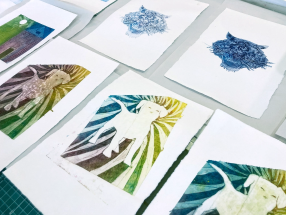Case Study: Can Printmaking Make Us Happier
Authors(s), Creator(s) and Contributors: Edmund William Chambers - Cardiff Print Workshop
Publication Date: 16/01/2024
Categories: Case Studies
Partner(s): Cardiff Print Workshop Ty Canna Mental Health Outreach Services, Cardiff Council
Funder(s): Arts Council Wales - Arts, Health and Wellbeing Lottery Programme, Ty Canna Mental Health Outreach Services, Cardiff Council Cardiff Print Workshop
Introduction
This pilot project was a partnership between Cardiff Print Workshop (CPW) and Ty Canna -Cardiff Council’s Mental Health Outreach Services. Starting in April 2023, it consisted of six weekly printmaking sessions with two groups of five service users, followed by an exhibition of the resulting work at Llanover Hall Arts Centre. A further three training sessions were delivered for volunteers at Ty Canna, to enable them to deliver printmaking activities in-house. The aim was to explore whether there are any particular characteristics of the printmaking process that can promote wellbeing and that are beneficial to people with mental health difficulties, so that this can inform and shape any future health-related projects led by CPW and can contribute to evidence about this particular art form.
The Challenge
Ty Canna works with adults living with poor mental health, who are referred to their service by the community mental health, addictions and forensic teams. They assist their service users to see a life beyond their mental health diagnoses and work with them to achieve goals towards recovery. They believe the arts can play a powerful role in helping them to achieve this. Significant research has been done on the benefits of the arts for wellbeing and mental health but there is limited evidence for the benefits of the specific art form of printmaking. We developed this pilot project to explore whether there are any particular characteristics of the printmaking process that are beneficial to people with poor mental health and how best to sustain any benefits beyond the project's duration.
The Approach
Starting in April 2023 CPW delivered six 2-hour, weekly printmaking sessions to two groups of five participants - all of whom are adults who have been referred to Ty Canna and are living with poor mental health. During these sessions, the participants were introduced to three different printmaking techniques (monoprint, drypoint, collagraph). Five of these sessions were delivered at Cardiff Print Workshop and one was delivered at Ty Canna. The sessions were designed so that no prior artistic experience or skills were necessary. Time was taken at the end of each session to reflect on the work produced and to comment on each other’s prints. The work produced during these sessions was exhibited for a month at a local gallery space, Llanover Arts Centre, and an opening evening was held for participants, their family and friends. Finally, in July 2023, three 2-hour training sessions were delivered to 4 Ty Canna volunteers, to teach them the skills required to lead simple printmaking sessions in-house at Ty Canna, focusing on techniques that do not require a printing press. A collection of step-by-step work sheets were developed to support this continuation of Ty Canna’s printmaking journey, and a kit with the necessary printmaking kit was provided.
The Impact
We evaluated our project via: direct observation; written feedback; an open-ended focus group session; and an interview with Ty Canna staff. We found that printmaking does appear to have particular characteristics that are beneficial to people with poor mental health. These were identified as:
1) The possibility of reworking a print – the need to embrace “trial and error” and the element of chance involved - encourages participants to relinquish control and promotes experimentation “A lot of us like to be in control. Printmaking forces you to let go, in a safe way, and to try new things” “I’ve experimented more in the past 4 weeks than I have in years”
2) The printmaking process - giving form to the idea as the artwork progresses in stages -promotes concentration and problem solving “I do a lot of creative activities but I usually don’t think about it after the session. With printmaking, I kept thinking about it afterwards, trying to figure out the best way to achieve the effect I wanted” “I don’t normally stick to things, after a while I give up. But I’ve been able to keep my concentration, which is hard for me”.
3) The print workshop space, where inks, materials and the press are shared promotes social connections. "We worked as a team"
Lessons Learned
In addition to the findings above, participants also commented on the importance of the “safe, friendly and explorative environment” that CPW created for them. The majority also said that they would have liked the project to have lasted longer. We had intended for one of our main evaluation tools to be the Warwick Edinburgh Mental Wellbeing Scale but it became apparent that our participants did not like this, and that too many external factors could influence the results. CPW will use all learning to inform and shape future projects
The Legacy
We aimed to build in sustainability into the project by training volunteers to deliver printmaking sessions in-house, and providing the resources and materials required for this. CPW will remain in contact with Ty Canna to evaluate the success of this approach. CPW hopes to continue working with Ty Canna but also to partner with other organisations working to promote improved wellbeing amongst adults with poor mental health. Any future projects will will aim to focus on the beneficial characteristics of printmaking identified via this project.
Website and Social Media Links
www.cardiffprintworkshop.co.uk
@cardiff_print_workshop
https://www.cavamh.org.uk/directories/ty-canna-outreach-service-and-user-led-resource-service/
Contact Details
Cardiff Print Workshop - cardiffprint@googlemail.com
Michele Aitchison - aitchison.michele@gmail.com
Bill Chambers - billchambers66@gmail.com
Millie Tucker - Millie.Tucker2@cardiff.gov.uk
Tags: Visual arts; printmaking; mental health; adults; Cardiff

